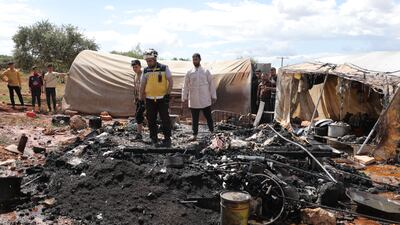Northern Syria's fragile infrastructure will be destroyed if a feared military escalation takes place, a top International Committee of the Red Cross official has said.
This could put tens of thousands of people at risk, said Fabrizio Carboni, the ICRC's Near and Middle East regional director.
“North-east Syria is fragile, unstable, disputed territory, we really hope that the violence won’t escalate there. If it does, you put at risk people and essential services,” he told The National.
Turkey in recent weeks has warned of a new ground offensive into Kurdish-controlled parts of Syria following a bomb attack in Istanbul last month, which it blames on Kurdish separatists based in Syria and northern Iraq. It has faced growing international calls for restraint.
Turkey has launched scores of artillery and air strikes in northern Syria since November 20, reportedly killing nearly 200 people.
The US and other western states have urged against any cross-border operations.
If a military operation does occur then it will “provoke the movement of people, tens of thousands — this is speculation, maybe nothing will happen, but if it does then we could see more destruction” of the country's limited remaining infrastructure, Mr Carboni said.
Violence “will take place in a fragile environment where destruction has been widespread — it’s the worst state in the region that has been affected,” he said.
The main problem is that this is “not happening in an area where there is a healthy population where services are available. I hope there will be a way out of this, a negotiated one,” he added.
Also, the ICRC may not be able to gain access to conflict zones, putting thousands of people in danger.
“I don’t know what the people in Syria will do, it’s really unbearable, I don’t know where people find the strength to go through these difficulties,” he said.
About 14 million Syrians, half of whom are children, require humanitarian assistance — the highest number since the conflict began in March 2011, according to the ICRC.
The country has the highest number of internally displaced people, with more than 2.5 million living without adequate shelter. Years of war have hit the economy, pushing 90 per cent of the population below the poverty line, and unemployment to as high as 50 per cent.
“It's not like the situation is improving, 90 per cent of the population needs humanitarian assistance, it’s really a lot of people,” he said.
If Syria has a harsh winter this year, “it's going to be desperate, really desperate and we'll see less attention to Syria. Funding is under pressure, it’s really bleak,” Mr Carboni said.
The ICRC official's comments come after a Turkish military vehicle ran over a woman and a child in a northern Syrian town on Monday, killing both and sparking local protests.
Opposition activists said the incident involving two armoured vehicles happened in the town of Atareb, west of the northern city of Aleppo and about 16km from the Turkish border.
More international help is needed
International attention should go beyond a humanitarian response in Syria, Mr Carboni said.
“We regret that a political process is going nowhere. At the end of the day this is the solution, we will not be able as humanitarian actors to compensate for the lack of normality in Syria and around Syria,” he said.
Nine rounds of UN-mediated peace talks — known as the Geneva II process — failed to make progress, with President Bashar Al Assad apparently unwilling to negotiate with political opposition groups that insist he must step down as part of any settlement.
Russia, Iran and Turkey set up parallel political talks, known as the Astana process, in 2017.
An agreement was reached in 2018 to form a 150-member committee to write a new constitution, leading to free and fair elections supervised by the UN.
It took until 2019 to establish the committee and yet little has been achieved so far. The latest round of talks earlier this year found the committee's members unable to find a common path.
Syria’s civil war, which began in 2011 after a violent crackdown on anti-government protesters led to an armed rebellion, has largely ended, although Al Qaeda-linked militants still control the north-eastern governorate of Idlib, an area overcrowded with an estimated 1.7 million displaced Syrians.
The President’s forces have regained most of the country from secular rebel groups, ISIS and an assortment of Islamist militias.













